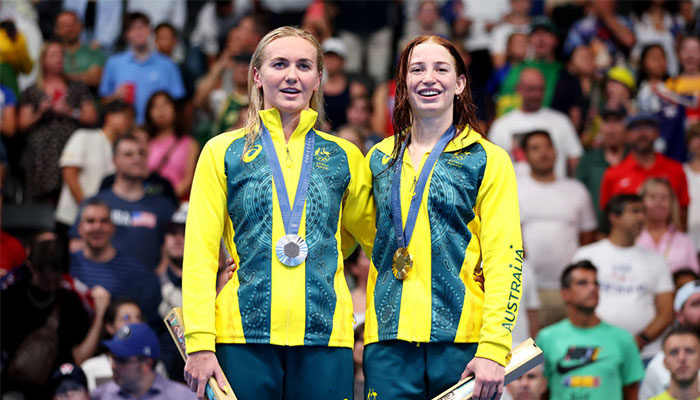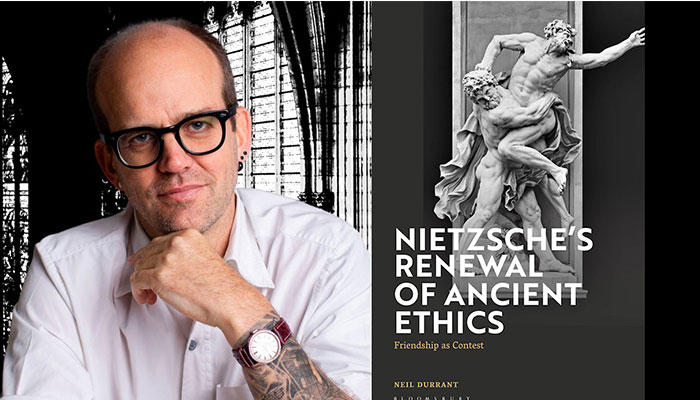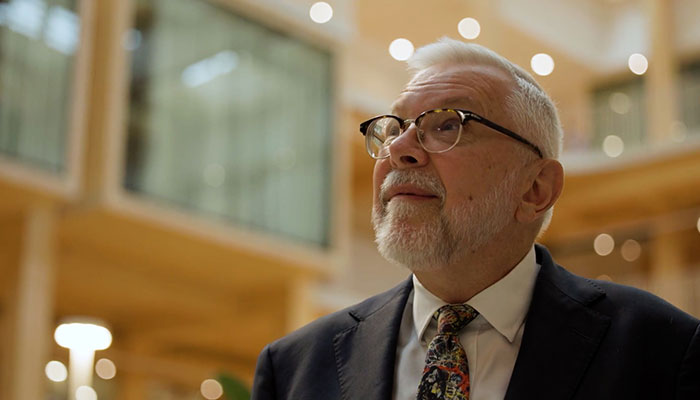Great Australian swimming teammates Mollie O’Callaghan and Ariarne Titmus shared an Olympic moment this week – two great friends, first and second on the dais.

One of the reasons this moment is so special is because it brings together two seemingly opposite things – close friends (in the team) and mortal enemies (in the pool).
It also happens that friendship is one of the three values of the Olympic movement, alongside excellence and respect.
The idea that friendship might actually be the safest place for you to be your most competitive self goes all the way back to Ancient Greece. The Olympic movement started in Ancient Greece, as most people know. What is often overlooked is that friendship is also something the Ancient Greek philosophers spoke about often.
Philosophers like Aristotle and Epicurus placed a very high value on friendship, although for very different reasons. It even made a poet of Epicurus, who wrote that “friendship dances around the world announcing to all of us that we must wake up to blessedness".
As it happens, there are very good reasons why this extremely competitive society was obsessed with friendship. The European philosopher Friedrich Nietzsche picked up on this. Inspired by his reading of the Ancient Greeks, Nietzsche thinks friendship is actually the most important ingredient for any successful relationship.
We can be pushed to new heights – intellectual, artistic, sporting, or otherwise. Sometimes the best thing a friend can do for you is to be your enemy.
The reason for this is surprising. If you compare friendship to other kinds of intimate relationships – like lovers or spouses or parents or siblings – it has one thing going for it that none of those other relationships have.
Unlike other kinds of relationships, friendship has very few rules. Society tends to put massive moral and practical guardrails around our intimate lives. We govern relationships either through legal means like marriage or moral means like exclusivity. We govern how parents and children relate with moral and material demands about being a ‘good’ parent or a ‘good’ child.
But friendship is basically a free-for-all.
This allows friends to do something for each other that nearly no other relationship is capable of. It allows friends to oppose each other. For a time, a friend can become a mortal enemy. This can happen without the material sacrifice of, say, divorce, or the moral transgressions of, say, being a bad son.
- Life in a new language: How migrants face the challenge
- Journalling about everyday stressors could boost resilience
And because friends can oppose us, we can learn a lot more from them than we can from other people. We can be pushed to new heights – intellectual, artistic, sporting, or otherwise. Sometimes the best thing a friend can do for you is to be your enemy.
The reason this works is that, even though they are your enemy for a while, they do this for one reason. Not to destroy you. Not because they hate you. They don’t want to annihilate you. They want you to be the best that you can be. And they are willing to sacrifice everything for that – even comfort and happiness.
In his book The Gay Science, Nietzsche puts it best:
“Here and there on earth there is probably a kind of continuation of love […] a shared higher thirst for an ideal […] But who knows such love? Who has experienced it? Its true name is friendship.”
Maybe this is what makes us feel so good about the great spectacle we saw in the pool this week. Not the desire to win but love in the pursuit of excellence.

Dr Neil Durrant, pictured above, is the Faculty of Arts Executive Director and Adjunct Fellow in the Department of Philosophy. He is the author of Nietzsche’s Renewal of Ancient Ethics: Friendship as Contest, published in 2024 by Bloomsbury Academic.
Dr Durrant also produces a weekly philosophy newsletter titled 'Provocations' .



